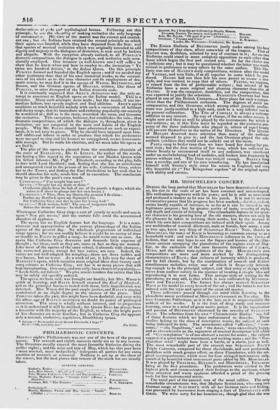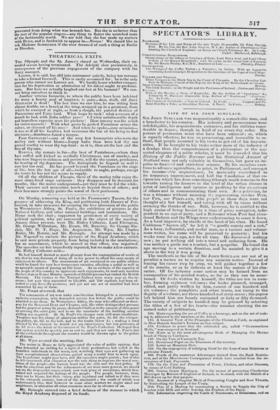MR. MOSCHELES'S CONCERT.
DURING the long period that MoseneLes has been domesticate d among us, his rise in the scale of art has been constant and uninterrupted. His enthusiasm augments with his years; and be is still as unwearied and profound a student as he was in his youth. It is not by increase of executive power that his progress has been marked,—for dim, indeed, seems hardly capable of increase, in so fur as it can be turned to any legitimate purpose; but by greater purity of taste, severity of style, and depth and extent of learning. One remarkable feature in his musi- cal character is his growing love of the old masters, shown not only by the pleasure he takes in reviving their works, but by the manner in which his own later compositions are imbued with their spirit. Among our multitudes of musical dilettanti, male or female, how many, a year or two ago, knew any thing of SEBASTIAN BACH ? Now, thanks to MOSCIIELES, the name of BACH is becoming as common among us as a household word; and such is AIoscitEEes's influence in tire circles of fashion, that we may hope to see the fugues and lessons of the illus• trious ancient occupying the pianofortes of the regions even of May- fair, to the exclusion of the now favourite frivolities of Czl.agy, Benz, and the other note-splitters of the day. Mosona.us's own compositions are more and more marked by the distinguishing characteristics of BACH ; that richness of harmony which is produced, not by full chords, but by the combination of smooth and distinct simultaneous melodies, every one of which is frequently interest- ing enough to be the principal subject, and that unity ot design which arises from endless variety in the manner of treating a simple idea and reproducing it in new forms. This antique style of writing for the pianoforte, we may add, is that which is now cultivated by Al I:NDELS- BOHN and THALBERG. The former has always avowed SEansTins lincti as his model in every branch of the art ; and the latter is not less imbued with the style and spirit of the great old master. These reflections passed through our mind while listening to the pianoforte music performed at Mown ELES'S concert on Tale sday. His own Concerto Patin:ague, as it is the last, so it is unquestionably the noblest of his works. It is the fruit of deep study and immense learning, sown in a mind of great native power. It is the imagination and passion of BEETHOVEN chastened by the severity of SEBA BACH. The selection from his own " Characteristic Studies " was full of those features which we have endeavoured to dean the. These studies belong to the class of descriptive music, the subject of each being indicated its title. The movements called "affection," "inno- cence," " aila Napolitana," and "the dance," were exceedingly happy, and as characteristic as the vagueness of musical description will admit of. "CoLtemplation" is of too abstract a nature for music ; the subject suggested a quiet andante movement, and nothing more ; and the " Bac- chanalian revel " might have been a battle, or a storm, just as well. The most remarkable part of the concert was SEBASTIAN Bacit's Triple Concerto, composed for three cluvichords, and now perfornied, doubtless with much greater effect, on three Pianofortes, with the on- ginul accompaniments, which were for four stringed instruments only, enriched by beautiful wind instrument parts added by Mr. MOSCHELES. It was played by THALISERG, BENEDICT, and MOSCHELES ; II A 1.13 E R being at the first pianoforte. The performers were excited to the highest pitch, and communicated their feelings to the audience, whose deep attention and warm applause afforded a proof of the growing taste for fine instrumental music. The vocal part of the concert was of the usual calibre. The only remarkable circumstance was, that Madame SCHRCEDER, who sang two German songs of SCHUBERT'S with all her German taste and feeling, was prevented by hoarseness from singing a duet of Dos:in:Tres with Gain. We were sorry for her hoarseness; though glad that she was prevented from doing what was beneath her. But she is no better than the rest of the popular singers—any thing to flatter the wretched taste of the fashionable world. We are told that she has made up matters with BUNN, and is forthwith to appear in—Norma! We should like to ask Madame SCHRtEDER if she ever dreamed of such a thing at Berlin or Dresden.



























 Previous page
Previous page